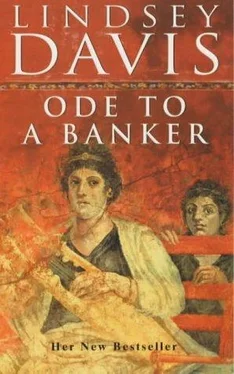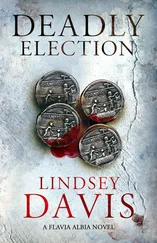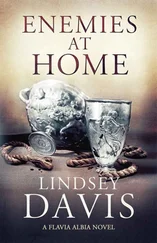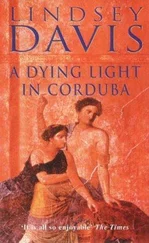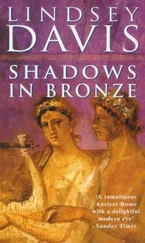Lindsey Davis - Ode to a Banker
Здесь есть возможность читать онлайн «Lindsey Davis - Ode to a Banker» весь текст электронной книги совершенно бесплатно (целиком полную версию без сокращений). В некоторых случаях можно слушать аудио, скачать через торрент в формате fb2 и присутствует краткое содержание. Жанр: Исторический детектив, на английском языке. Описание произведения, (предисловие) а так же отзывы посетителей доступны на портале библиотеки ЛибКат.
- Название:Ode to a Banker
- Автор:
- Жанр:
- Год:неизвестен
- ISBN:нет данных
- Рейтинг книги:4.5 / 5. Голосов: 2
-
Избранное:Добавить в избранное
- Отзывы:
-
Ваша оценка:
- 100
- 1
- 2
- 3
- 4
- 5
Ode to a Banker: краткое содержание, описание и аннотация
Предлагаем к чтению аннотацию, описание, краткое содержание или предисловие (зависит от того, что написал сам автор книги «Ode to a Banker»). Если вы не нашли необходимую информацию о книге — напишите в комментариях, мы постараемся отыскать её.
Ode to a Banker — читать онлайн бесплатно полную книгу (весь текст) целиком
Ниже представлен текст книги, разбитый по страницам. Система сохранения места последней прочитанной страницы, позволяет с удобством читать онлайн бесплатно книгу «Ode to a Banker», без необходимости каждый раз заново искать на чём Вы остановились. Поставьте закладку, и сможете в любой момент перейти на страницу, на которой закончили чтение.
Интервал:
Закладка:
Lindsey Davis
Ode to a Banker
PRINCIPAL CHARACTERS
Old Stagers
M. Didius Falco/Dillius Braco/Ditrius Basto – a well-known Roman
Helena Justina -a heroine (a loyal reader)
Ma (Junilla Tacita) -a canny depositor
Pa (Gerninus) -a chipped old block
Maia Favonia (a sister) -a late-developing job-seeker
Junia (another sister) -a skilled staff manager
Rutilius Gallicus – a high profile spare time scribbler
Anacrites – a low lyer with variable interests;
A. Camillus Aelianus – an ill-equipped aristocratic trainee;
Gloccus and Cotta – invisible bathhouse contractors;
Numerous children, dogs, pregnancies and pups;
The Vigiles
Petronius Longus
Fusculus
Passus
Sergius
The World of the Arts
Aurelius Chrysippus -a patron of literature (a swine) a scroll-seller (a good critic) (a what?)
Euschemon – an old hand with attitude
Avienus – a historian with writer's block
Turius – a utopian with allergies (to work) the Shakespeare (Bacon?) of his day
Urbanus Trypho – a dramatist?
Anna, Trypho's wife – who may have a way with her
Pacuvius (Scrutator) – a bad-mouthing satirist (extinct species)
Constrictus Blitis – a love poet who needs to be dumpedfrom a writers' group (not writing at present)
From Commerce
Nothokleptes – a thieving bastard (a banker)
Aurelius Chrysippus (him again) – a secretive businessman
Lucrio – a personal banking executive (unsafe deposits)
Bos – a big man who explains bank charges
Diomedes – a very religious son with artistic hobbies
Lysa (first wife of Chrysippus) – a maker of men and their businesses (hard feelings)
Vibia (second wife of ditto) – a keen home-maker (soft furnishings)
Pisarchus – a shipping magnate who may be sunk
Philomelus – his son, a drudge with a dream
Stock Characters
Domitian – a Young Prince (a hater)
Aristagoras – an Old Man (a lover?)
An old woman – a Witness
Perella – a Dancer
ROME: MID JULY-12 AUGUST AD74
A book may be defined… as a written (or printed) message of considerable length, meant for public circulation and recorded on materials that are light yet durable enough to afford comparatively easy portability.'
Encyclopaedia Britannica'[The creditor] examines your family affairs; he meddles with your transactions. If you go forth from your chamber, he drags you along with him and carries you off; if you hide yourself inside he stands before your house and knocks at the door.
If [the debtor] sleeps, he sees the moneylender standing at his head, an evil dream… If a friend knocks at the door he hides under the couch. Does the dog bark? He breaks out in a sweat. The interest due increases like a hare, a wild animal which the ancients believed could not stop reproducing even while it was nourishing the offspring already produced.'
Basil of CaesareaI
Poetry should have been safe. 'Take your writing tablets up to our new house,' suggested Helena Justina, my elegant partner in life. I was struggling against shock and physical exhaustion, acquired during a dramatic underground rescue. Publicly, the vigiles took the credit, but I was the mad volunteer who had been lowered head first down a shaft on ropes. It had made me a hero for about a day, and I was mentioned by name (misspelled) in the Daily Gazette.
'Just sit and relax in the garden,' soothed Helena, after I had rampaged about our tiny Roman apartment for several weeks. 'You can supervise the bathhouse contractors.'
'I can supervise them if they bother to turn up.'
'Take the baby. I may come too – we have so many friends abroad nowadays, I ought to work on The Collected Letters of Helena Justina.'
'Authorship?' What – by a senator's daughter? Most are too stupid and too busy counting their jewellery. None are ever encouraged to reveal their literary skills, assuming they have them. But then, they are not supposed to live with informers either.
'Badly needed,' she said briskly. 'Most published letters are by smug men with nothing to say.'
Was she serious? Was she privately romancing? Or was she just twisting the rope on my pulley to see when I snapped?
'Ah well,' I said mildly, 'You sit in the shade of a pine tree with your stylus and your great thoughts, fruit. I can easily run around after our darling daughter at the same time as I'm keeping a check on a bunch of slippery builders who want to destroy our new steam room. Then I can dash off my own little odes whenever there's a pause in the screaming and stonecutting.'
Every would-be author needs solitude and tranquillity.
It would have been a wonderful way to pass the summer, escapingfrom the city heat to our intended new home on the Janiculan Hill – except for this: the new home was a dump; the baby had embarked on a tantrum phase; and poetry led me into a public recital, which was foolish enough. That brought me into contact with the Chrysippus organisation. Anything in commerce that looks like a safe proposition may be a step on the route to grief.
II
I must have been crazy. Drunk too, maybe. Why had I received no protection from the Capitoline gods? All right, I admit Jupiter and Minerva might feel I was their most insignificant acolyte, merely slave to a sinecure, a placeman, a careerist, and a half-hearted one at that. But Juno could have helped me out. Juno really should have bestirred herself from leaning on one elbow, playing Olympian board games of hero-baiting and husband-tracking; the Queen of Heaven could have stilled the dice just long enough to notice that the new Procurator of her Sacred Geese had an unworkable glitch in his otherwise smooth-running social life. In short: I had stupidly agreed to be the warm-up act at someone else's poetry show.
My fellow author was a senator of consular rank. Disastrous. He would expect his friends and relatives to be seated on the comfortable benches while mine squashed into a few inches of standing room. He would grab most of the reading time. He would go first, while the audience was still awake. What's more, he was bound to be a bloody awful poet.
I am talking about Rutilius Gallicus. That's right. The same Rutilius Gallicus who would one day be the Urban Prefect – the Emperor's law and order chief, Domitian's strong-arm boy, that great man who is nowadays so greatly loved by the populace (as we are told by those who tell us what to think). Twenty years ago, at the time of our reading together, he was just any old ex-consul. Then, we still had Vespasian on the throne. As his legate in Tripolitania, Rutilius had recently solved a boundary dispute, for what that was worth (not much, unless you had the misfortune to live in Lepcis Magna or Oea). He had not yet become eligible to govern a province, was not yet famous for his German exploit, and nobody would ever have expected him to be the subject of heroic poetry himself. A celebrity in waiting. I thought him a pleasant mediocrity, a provincial just about holding up to wearing his senatorial purple.
Wrong, Falco. He was my friend, it seemed. I viewed this honour with great caution as I had gained the impression even then that he was also cosying up to Domitian, our least loveable imperial prince. Rutilius must think there was advantage in it. I chose my pals more carefully.
At home, with the matronly wife who hailed from his own town of origin – Augusta Taurinorum in northern Italy – and with whatever they possessed of a family (how should I know? I was just a newly- promoted equestrian; he might have befriended me as a fellow exile when we first met in faraway Africa, but in Rome, I would never be taken home to meet his noble kin), at home the gladsome Gallicus would be known as Gaius or whatever. I did not qualify to use his private name. He would never call me Marcus either. I was Falco; for me, he would remain 'sir'. I could not tell if he knew there was mockery clothing my respectful tone. I was never too obvious; I like to keep my record clean. Besides, if he did become Domitian's crony, you never know where toadying may lead.
Читать дальшеИнтервал:
Закладка:
Похожие книги на «Ode to a Banker»
Представляем Вашему вниманию похожие книги на «Ode to a Banker» списком для выбора. Мы отобрали схожую по названию и смыслу литературу в надежде предоставить читателям больше вариантов отыскать новые, интересные, ещё непрочитанные произведения.
Обсуждение, отзывы о книге «Ode to a Banker» и просто собственные мнения читателей. Оставьте ваши комментарии, напишите, что Вы думаете о произведении, его смысле или главных героях. Укажите что конкретно понравилось, а что нет, и почему Вы так считаете.
